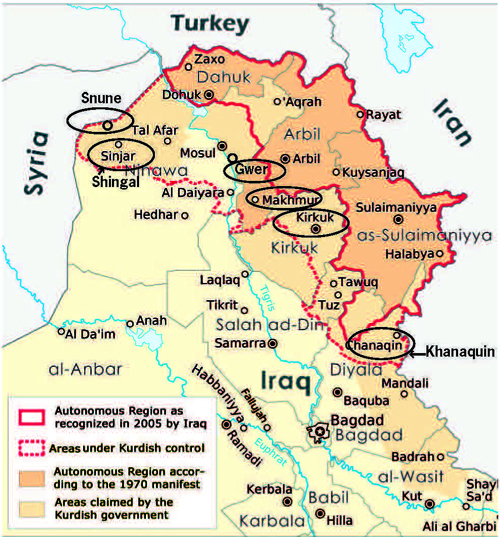
Vol. 81/No. 40 October 30, 2017
(front page)
With US complicity, Baghdad seizes Kurdish city
of Kirkuk

Thousands of Kurds fled Kirkuk, heading towards the capital Erbil and Sulaymaniyah in the eastern Kurdistan region. Within 48 hours Iraqi forces also took over Kurdish-controlled areas near Mosul, Sinjar and Khanaqin.
Peshmerga, the Kurdistan Regional Government’s army, had deployed some 9,000 troops to Kirkuk together with civilian volunteers, vowing to defend the city. Divisions emerged within the KRG leadership. Patriotic Union of Kurdistan officials “betrayed Kurdistan” by “abandoning key fronts,” said a peshmerga statement. The PUK along with the Kurdish Democratic Party is part of the Kurdistan Regional Government coalition.
Facing this situation, the remaining peshmerga retreated to avoid a bloody clash with high casualties, possible conflict with other Kurdish forces, and to concentrate their forces to defend the autonomous Kurdish region and its fight for independence.
“The durable nation of Kurdistan, the loyal people and volunteers, brave peshmerga, the honorable families of martyrs,” said an Oct. 17 statement issued by KRG President Masoud Barzani, “the blood your sons gave and continue to give on the freedom path of Kurdistan, the loud voices you raised for the independence of Kurdistan that you sent to all nations and world countries will not be wasted now or ever.
“The Kurdistan nation with the power of the brave ones, sooner or later, will eventually reach its right and sacred objectives,” the statement said. “And now we advocate for the protection of the unity and resilience of the Kurdistan nation and the political parties.”
The 30 million Kurds living in Iran, Iraq, Syria and Turkey — the largest nation worldwide without its own state — were inspired by Kurdistan’s independence referendum victory, which also aroused solidarity from workers throughout the Mideast and worldwide.
Qassem Soleimani, the commander of Iran’s Quds Force, was in Kirkuk leading the assault. He was designated “military adviser” to Hashd al-Shaabi by the Iraqi government.
“In the beginning the Peshmerga put up a fierce defense,” reported the Kurdish news agency Rudaw. “But the Hashd al-Shaabi widened their advance, at which point many Peshmerga were wounded and killed.” Some were beheaded.
‘Assault with American weapons’
“We’re not taking sides,” President Donald Trump told the media Oct. 16. But Washington opposed the referendum and insists the Kurds submit to maintaining the territorial integrity of Iraq. “Not taking sides” really meant they backed the Iraqi government and its Tehran-backed allies.This assault was “launched by American weapons, armored vehicles, tanks and other coalition weapons,” said an Oct. 15 statement from Peshmerga General Command. These were given to the Iraqi forces “under the name of the war on ISIS [Islamic State]” while “Peshmerga, also in the fight against ISIS, were not given necessary weapons to defend themselves.”
“The Kurds are amazing, and have been through a lot, but we need to get over our sentimentality,” Michael O’Hanlon, senior fellow at Brookings Institution and former advisor to the CIA, told the Wall Street Journal Oct. 18. “Their ambitions inside Iraq are not compatible with a stable internal situation for that country.”
Leading up to the military attack, the capitalist rulers throughout the region had launched a blockade and other attacks against the Kurds. The Iraqi regime halted international flights to the Kurdistan region. Ankara announced it is closing Turkey’s airspace to flights in and out of Kurdistan and planned to close its border crossings. Both Ankara and Tehran carried out military maneuvers with Iraqi forces on the Kurdish border.
Ankara threatened to join the assault on Kirkuk, claiming falsely that the peshmerga had invited fighters from the Turkish Kurdistan Workers Party (PKK) to join them there.
Kirkuk, historically Kurdish, has been claimed by Baghdad since an Arabization policy was carried out in the area by former Iraqi dictator Saddam Hussein. Baghdad refused to hold an agreed-upon 2007 referendum on Kirkuk’s status, fearing a majority would vote for inclusion in the KRG. Peshmerga forces stepped in when the Iraqi army collapsed and fled in the face of attacks by Islamic State in 2014, preventing the region’s oil fields from falling under IS control.
Taking advantage of the assault on Kirkuk, Islamic State seized two villages north of the city, Makha and Twelay, which had been under peshmerga protection.
Pressure on Kurdish leaders
The squeeze on Kurdistan and assault on Kirkuk opened up public disagreements within the Patriotic Union of Kurdistan, which along with the Kurdish Democratic Party, make up the majority KRG. Bafel Talabani, the son of late former Iraqi President and PUK leader Jalal Talabani, called Oct. 12 for dissolving the Kurdish-led Kirkuk Provincial Council and acceding to Baghdad’s demands that negotiations must be based on rejecting the referendum results.But the KDP and many PUK leaders rejected these demands.
After Kirkuk fell, Kosrat Rasul Ali, vice president of Kurdistan and deputy leader of the PUK, said “Some apostates abandoned the PUK’s doctrine without returning to our party’s leadership and became the invaders’ assistant to obtain some personal, temporary gains.”
Kurdish fighters have been the most effective fighting force against the reactionary Islamic State in both Iraq and Syria. Raqqa, the terror group’s former capital, fell to Kurdish-led forces Oct. 17.
With the recent defeats of IS, new conflicts have come to the fore, as Washington, Moscow and the capitalist rulers in the region look to assert their conflicting political and economic interests. All oppose the Kurds’ struggle for independence.
The Kurds in Syria are likely to face attack by the Basher al-Assad dictatorship there. And, the Wall Street Journal writes, “It’s unclear whether the U.S., which proclaimed neutrality in Iraq’s dispute with that nation’s Kurds, will do anything to protect its Syrian Kurdish allies if that happens.”
Related articles:
Protest the assault against Kurdistan!
US out of Mideast! Accept Kurds referendum vote!
Madrid steps up threats, attacks against Catalan national rights
Front page (for this issue) | Home | Text-version home